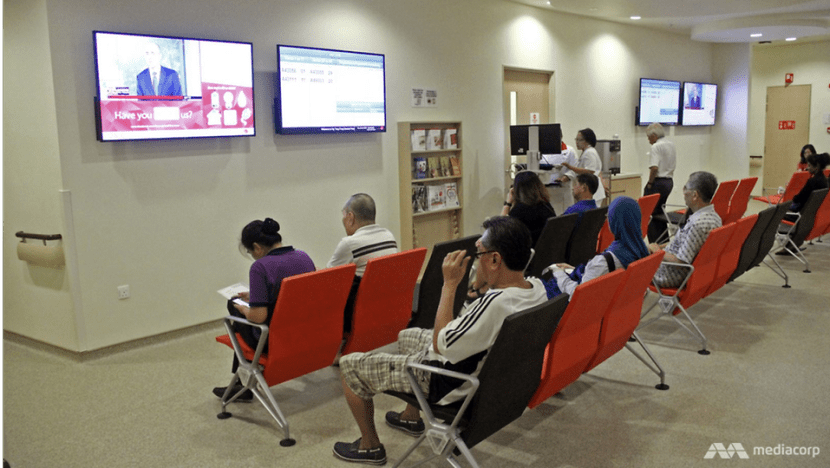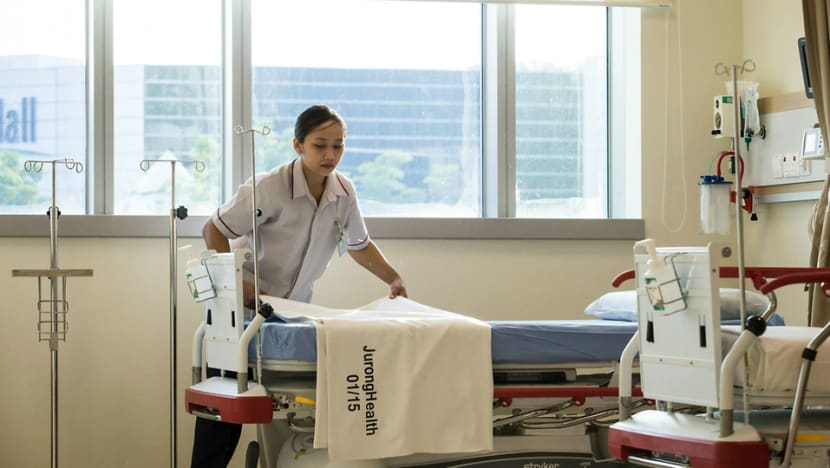commentary Singapore
Commentary: Singaporeans plan our whole lives, so why not our deaths?
Planning our end-of-life care can help our loved ones deal with difficult decisions and cope during a period of grief, yet Singaporeans don’t seem to do this, says palliative care expert Associate Professor Lalit Krishna.

An electronic patient chart is shown on the wall to a hospital room. (Photo: REUTERS/Mike Blake)
SINGAPORE: We often ask ourselves what makes our existence meaningful and do our utmost to live our lives to the fullest, achieve the goals we set out for ourselves, and plan to contribute to society. Yet, many of us hesitate to plan for the end of our lives.
Perhaps it doesn’t occur to us. Perhaps we put it off because it isn’t a pleasant exercise. But in doing so, we do a disservice to our loved ones, who have to take on the burden of figuring out what to do when we are incapacitated – for many, because of a gradual deterioration with disease and illness.
Advanced Care Plans (ACPs) are often described as an effective means of ensuring that care determinations continue to be met in a manner in keeping with a person’s goals of care when he loses the capacity to make those determinations.
In practice, an ACP often serves a number of functions. Probably best known is its function as an instrument to ensure a patient’s voice continues to be heard on matters pertaining to his medical needs.
This includes the selection of treatment options, place of care and death, and determination of the extent of healthcare to be applied when patients themselves are unable to participate in these decisions or are incapable of representing themselves.

In truth, this function of the ACP belies a much greater objective of capturing a patient’s general goals, values, beliefs and aspirations that could form a reliable template that informs families and healthcare professionals of what the patient would have wanted when confronted by unforeseen situations along his care journey.
GUIDANCE FOR FAMILIES AND CAREGIVERS
Indeed, a further purpose of an ACP is to offer support and guidance for families and caregivers, who frequently expect to and are often tasked with caring for patients. It is perhaps this aspect of the ACP that requires trumpeting, as taboos about talking about death and dying continue to pervade local practice and inhibit wider use of ACPs.
Consider the case of a patient in Singapore – James, his family and his uncle Eric.
James and his family were alarmed when they were called and asked to come down to the hospital as his uncle, Eric, had been admitted in a critical condition.
This distress mounted as James was told that the doctors would like his input on serious decisions regarding his uncle’s care.
Eric had been away from his family for the past five years working on various projects around the region. Eric only made infrequent and brief visits home, and even then had made little contact with James and his family.
On visiting Eric, James, his siblings and his mum - Eric’s only sibling and closest relative - were told that Eric was seriously ill with kidney failure and a chest infection requiring both ventilator and dialysis support.
Their distress about this news was lessened somewhat when they were told that Eric had already prepared an ACP not long after he had been diagnosed with kidney failure and diabetes, following a heart attack the month before.
In his ACP, Eric had made clear his preferred place of care and death. Based on his own values, beliefs and goals of care and his understanding of his condition, Eric had also recently made an advance statement on what he would like or would not like to happen in the event of his deterioration, including an advance decision to refuse treatment.
For example, Eric was clear that he did not wish to be ventilated for longer than a few days, if there was no real improvement in his condition, or if the doctors felt that he would not likely recover his ability to care for himself independently.
Eric also stipulated that he did not want to be resuscitated or have his life prolonged in any manner.

For James and his family, the ACP meant not having to make decisions on Eric’s behalf, and not having to live with the doubt and sometimes the guilt of those decisions. For which family member can say definitively without guilt that Eric should be taken off the ventilator if his condition doesn’t improve? Isn’t it far easier to say, let’s see what happens with one more day?
The pain of dealing with an impending loss of a loved one is already very difficult to manage.
Eric also nominated James to help with his personal affairs, unaware that the ACP did not provide his nephew with such powers to act on his behalf, and that a Lasting Power of Attorney was required to provide James with the legal mandate to care for Eric’s assets and financial affairs.
ACP AS A PROCESS, NOT AN OUTCOME
Yet, the ACP allowed Eric’s care to be crafted for in a manner that was consistent with his own values, beliefs and wishes even when Eric hadn’t fully foreseen this particular eventuality in his disease trajectory.
Eric’s case serves to highlight the fact that an ACP is only of value when the patient is informed of his clinical situation, prognosis and treatment options, and is actively involved in his care consideration.
So discussions when creating an ACP must necessarily be wide ranging, honest and include general questions on a broad range of care and clinical situations. To be effective, the patient must have enough information to the level and detail that they determine to be sufficient to make a decision.
In the course of thinking through what should go into an ACP, the meaning of the terms and statements within should be clarified, and deeper discussions about the patient’s values and beliefs should be explored to facilitate the family’s decision-making in unanticipated situations.

To ensure that the ACP remains relevant in a changing clinical and psycho-social context, the creation of an ACP should be seen as a continuing discussion, so that the ACP is reviewed regularly and updated to reflect the patient’s particular situation and views.
ACP NEEDS FURTHER DISCUSSION
It is also clear that an ACP needs to be discussed by all stakeholders, especially with a patient's loved ones.
Ideally, Eric should have discussed his plans with James to inform him of his wishes, given that a variety of unforeseen situations might occur. Information provided could help the family facilitate treatment decisions that truly reflect the patient’s wishes and values.
Here, the viability, willingness and ability of the family and other stakeholders to support the patient’s goals and wishes should also be discussed. This entails sensitivity and balancing the rights of the family versus the patient.
On the one hand, the family should only be involved with the consent of the patient, because we should respect the patient’s privacy and wishes.
On the other hand, expecting the family to sacrifice time, money and effort to meet the goals of the patient must also consider the interests and wishes of the family.
In the same vein, discussions with James would have allowed James to be better prepared for the role that Eric expected of him and facilitated the creation of a Lasting Power of Attorney to enable James to manage Eric’s assets in a manner that was consistent with his goals and wishes.
Perhaps viewing an ACP as a tool to help the family will help reduce collusion and circumvention of the patient’s wishes, and encourage wider use of this tool.
After all, when Singaporeans do so well in planning out our lives, it seems odd that we should stop when it comes to planning our deaths. It is at these times that our loved ones need us most to have done so.
(The names used in this commentary are pseudonyms, to protect the identity of the patient and his family.)
Associate Professor Lalit Krishna is senior consultant at the National Cancer Centre of Singapore’s Division of Palliative Medicine.
This is the fifth commentary in Channel NewsAsia's series exploring key issues and challenges facing patients with terminal illnesses and care at the end of life.
Read the first commentary on what well-being means for someone with terminal illness here.
Read the second commentary on the challenges faced by youth who contract terminal illness, for whom growing old isn't an option here.
Read the third commentary on the debate on whether at life's end, people should spend their last days in the hospital here.
Read the fourth commentary on how hospice care can offer the terminally ill a ray of hope in those last days here.














